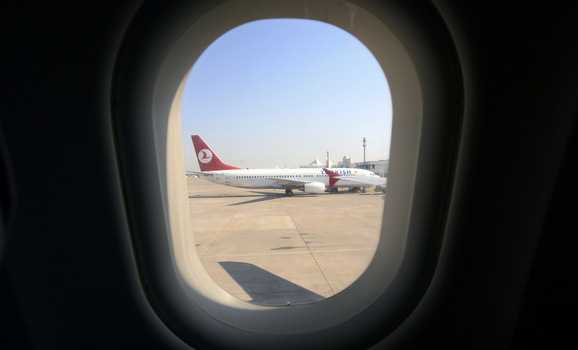Turks are proud of their language, and Turkey is emerging as Europe’s new shinning star. PHOTO: AFP
Turkey is turning heads. A few weeks ago the top brass of the entire Turkish army resigned- an act that could have previously brought down whatever democratic government was at the helm- but Prime Minister Erdogan reacted coolly and appointed a new army chief. The present AKP (Justice and Development Party) government has slowly chipped away the power of the deep state. Moreover many have alluded to Turkey’s pluralism and democracy as an example for all Muslim countries to follow.
Turkey was also the fastest growing country in the world last year, with a growth rate of just over 9%. It has transformed itself from the sick man of Europe to its shining star, as countries like Greece, Portugal and Spain, because of their inability to depreciate currency, gasp under the Euro zone’s hangman noose. Indeed, in a conversation I had with a member of the Ministry of Economic Affairs, I discovered that Turkey was not going to go begging for European Union EU) membership but would accept it on its own terms if offered.
The greatest challenge the country faces is making a new constitution.
In a 1980 coup the military drew up a defacto constitution for the country. As one would expect the focus of this constitution was stability, not individual rights. With the AKP’s third term in power, it looks like the party is going to attempt to draw up a new constitution. From the perspective of an international observer the two most interesting things to look at will be how the constitution defines (or does not define) the role of religion and secularism, and the Kurdish issue.
It is common to associate Turkey with secularism – where religion has no business of the state. However, the Turkish state is not secular in that sense, in fact it is laicist – where the state controls what parts of religion are acceptable and what are not – an important distinction. A secular state does not care whether a woman adopts a headscarf or not; a laicist state decides whether a woman should be allowed to wear a headscarf in a university or another public space (France and historically Turkey have ruled that they cannot). The laicist state was established by Ataturk whose cult still lives on even after more than 60 years of his passing. Ataturk’s paintings are ubiquitous inside homes and on public spaces. A friend of mine who was travelling the country related to me that a person she spoke to said Ataturk was like a father to him. His importance can be judged by the fact that the Turkish blasphemy law protects Ataturk not religion!
The Kurdish question also needs to be resolved. After the breakup of the multi-ethnic Ottoman Empire because of various rebellions of nationalism within the country, the Turkish state imposed homogeneity. There was a single idea of Turkishness and anything that deviated from this was perceived to be a threat to the Turkish state. The largest dissidents against this policy have been the Kurds. The Kurds (who have no country of their own but are split over 4 countries) demand that their cultural rights be accepted and that they be allowed to learn their language in schools. The state has been slow to respond, but in the past few years there have been signs of progress; recently a Kurdish channel was allowed to broadcast for the first time in Kurdish. The new constitution is likely to raise many questions about what kind of state Turkey wishes to be for the better part of the twenty first century.
What lessons can be learned from Turkey?
The first thing to note is that Turks are proud of their language. They do not have insecurities or inferiority complexes about not knowing any English and their pride in their language gives them a strong and authentic sense of identity – for both the elites and the non-elites, something which post colonial states like Pakistan lack.
The second lesson is that democracy does work given time. Whenever the Turkish army has come to power it has caused short term stability but in the long run it has not helped the country. In the absence of transparency and checks, all militaries make questionable policy decisions. It may surprise readers to know that even the staunchly pro-secular Turkish military employed violent religious militant groups (sound familiar?) at one point to suppress the Kurdish rebellion.
Ataturk’s reforms lifted Turkey from a backward country to a modern nation but they came at a cost; his secularization reforms were harsh on practicing Muslims in the country and have galvanized support against secularism by conservative Muslims all over the world. Some people told me stories about Qurans being flushed into toilets in the countryside during the post reform years. There was no way to confirm the veracity of this claim but it’s important to note that this impression was created. The fear of secularization as a threat to religion is a real one from the perspective of conservative Muslims and it must be addressed
The views expressed by the writer and the reader comments do not necessarily reflect the views and policies of The Express Tribune.
via What Turkey has done right – The Express Tribune Blog.
